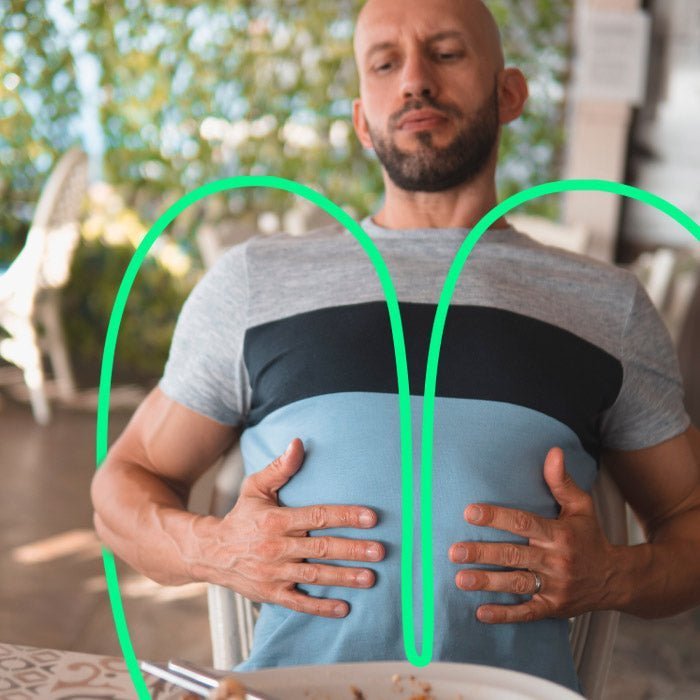Nausea after eating can be a distressing experience, it will often leave you wondering about the underlying causes of your sickness and what you can do to relieve your symptoms. Our medical guide is here to answer questions and provide tips and advice about the various factors that can contribute to feeling sick after eating, related symptoms, trigger foods, when its normal, ways to prevent it and when you should see a doctor.
What causes nausea?
Common causes of nausea include:
- Digestive disorders: various conditions such as gastritis, gastroenteritis, and peptic ulcers can irritate the lining of the stomach and cause discomfort. This discomfort can be heightened after consuming certain foods, and as a result cause nausea.
- Food Intolerances: Sensitivities or intolerances to certain foods, in particular lactose or gluten, can trigger symptoms in individuals who struggle to digest foods that contain them. Other foods that can cause nausea are detailed later in our guide.
- Parasitic infection: Parasitic infections in the gastrointestinal tract caused by common parasites such as Giardia lamblia (giardiasis), Entamoeba histolytica (amoebiasis), Cryptosporidium, and Cyclospora are known to cause nausea and vomiting. Other symptoms such as diarrhoea, stomach ache, and bloating may also start to present themselves. The only way to identify/diagnose a gut parasite is by testing. A gut parasite stool test detects the parasite’s DNA in a stool sample and is highly accurate.
- Gastroesophageal reflux disease (GERD): More commonly known as acid reflux, is the backward flow of stomach acid into the oesophagus. Acid reflux can cause discomfort and nausea when trigger foods are consumer which include fatty foods, fried foods, and alcohol to name a few.
- Medications and treatments: Certain medications, such as chemotherapy drugs or NSAIDs (nonsteroidal anti-inflammatory drugs) such as Naproxen can induce nausea particularly when taken on an empty stomach.
- Stress and anxiety: Research suggests that stress and anxiety can disrupt the body’s natural digestion process. In some individuals stress can speed up the digestion process whilst in others it may slow it down, causing a different set of symptoms for each.
- Gut dysbiosis, an imbalance in the good and bad bacteria found in the gut. A gut imbalance can disrupt the normal function of the gut, including digestion. It can present a number of symptoms, such as nausea.
Whilst the above list shows some of the most common causes of nausea, it does not mean that those causes are triggering your symptoms. You should adopt a personalised approach when it comes to trying to pinpoint your causes and triggers and look for patterns, whether that is related to certain foods or even certain life events that may trigger stress and anxiety.
Other symptoms associated with nausea
Nausea is often accompanied by other symptoms which include:
- Vomiting
- Stomach ache and discomfort
- Loss of appetite
- Excessive salivation
- Bloating or gas
- Tiredness and fatigue
Monitoring your symptoms and when they occur can help you to identify your triggers.
Foods that can cause nausea
Certain foods are more problematic for nausea symptoms than others, whilst it is common knowledge that unhealthy, processed, and fatty foods can cause nausea, there are a few others that have been known to contribute to symptoms.
- High-Fat Foods: Consuming fatty, processed or greasy foods can slow down the digestion process and cause symptoms such as bloating, constipation and feeling of fullness which can lead to feeling nauseous.
- Spicy Foods: Spicy foods can typically cause diarrhoea; this is because the body speeds up the digestion process to get rid of capsaicin which is an active compound found in spicy foods. Capsaicin can irritate the stomach lining and contribute to feelings of nausea.
- Strong smelling foods: Strong scents can also contribute to symptoms of nausea. Strong smelling foods such as onions and seafood can trigger feelings of nausea.
Being aware of these food triggers and making appropriate adjustments to your diet can help alleviate nausea symptoms.
A food sensitivity/intolerance test can also help you to pinpoint your trigger foods if you are struggling to identify them through an elimination diet.
Is it normal to feel sick after eating?
Feeling sick after eating is common and in most cases is completely normal. Feeling sick because of overeating, eating too quickly, eating foods that are rich and heavy or consuming any of the foods that typically cause nausea (such as the ones listed above) are all considered to within the normal realms of feeling nauseous.
Your symptoms may even be triggered by foods that are not typical nausea triggers, however everyone can react differently to different foods, it is important to try and identify your trigger foods so you can better understand your nausea causes.
If you find that your symptoms persist or start to cause you discomfort which affects your day-to-day life, this can be a sign of an underlying condition.
How can I prevent feeling sick after eating?
Simple lifestyle and dietary changes can help manage and reduce feelings of nausea after eating:
- Eating smaller more frequent meals: Opting for smaller, more frequent meals can aid digestion and prevent overloading the stomach and digestive system.
- Set your pace: When it comes to nausea, eating slower is better, this prevents overloading your stomach and stops signs of bloating, fullness, and nausea.
- Identifying your trigger foods: Pay attention to specific foods or ingredients that consistently trigger nausea and consider eliminating or minimising their intake.
- Stay hydrated: Regular sips of water and fluids throughout the day can prevent dehydration. Dehydration can also occur if you are unable to keep food or fluids down.
- Relax: Relaxation techniques such as breathing exercises, light exercises, stretches and general down time with friends and family can help to reduce stress. Stress can interfere with the body’s natural digestion process, keeping it at a minimum is essential.
- Avoiding strong smelling foods: Avoiding strong smelling foods should only be required if you have identified them as being one of your triggers. If you are not impacted strong smelling foods, don’t feel the need to eliminate them from your diet.
- Add some ginger: Ginger has been used for centuries as a natural remedy for nausea. It is also a relatively inexpensive way to relieve the symptoms of nausea.
- Understand your gut health: A gut microbiome test can measure the bacteria within your gut, and give you a full picture of how healthy your gut is. It can help you get to the bottom of why you may be feeling sick after certain foods by identifying bacteria imbalances, harmful bacteria and even foods that you should avoid.
Feeling hungry and nauseous at the same time: What to do?
Experiencing hunger and nausea at the same time can be a confusing situation. Sometimes, if you have not eaten; an empty stomach may trigger nausea due to stomach contractions that appear as a sign of hunger. It could also be a sign of dehydration which can cause an upset stomach.
To navigate the symptoms of nausea when you are feeling hungry you should opt for easily digestible foods, like plain crackers or toast to line your stomach before consuming a normal meal. Consuming smaller regular and meals while being mindful of trigger foods can also be beneficial.
If you are struggling to eat whilst feeling nauseous, or you find it difficult to keep foods down, you should contact your doctor as this can lead to signs of dehydration and malnutrition.
Nausea after eating small portions
If you’re feeling sick after eating a small portion, this could be a sign of a food intolerance. You should try making changes to the food you are eating to determine if your sickness is happening because of certain foods or ingredients. Even if you are consuming small amounts of food, if the food you are consuming is something you are intolerant to, it can cause nausea.
Other conditions that can cause nausea after eating small amounts of food include gastroparesis, which slows down the rate at which food is digested, meaning you will feel full quicker.
Should I try to eat if I feel sick?
If you're feeling sick after eating, it's generally recommended to give your digestive system some rest. Listen to your body and wait until the symptoms subside before attempting to eat again. It's essential to focus on hydration and consume small, easily digestible foods when you feel ready.
Complications and when to see a doctor
In most cases, feeling sick after eating is common and symptoms should clear up naturally without the need for treatment or medical intervention. However, there are a number of warning signs you should look out for when trying to determine the severity of your symptoms:
- Persistent or gradual worsening of symptoms
- Dehydration due to the inability to tolerate fluids or keep them down. This could also be caused by diarrhoea
- Blood in vomit or stool
- Unexpected weight loss
- Loss of appetite or inability to eat
- Severe abdominal pain
- Yellowing of the skin or eyes (jaundice)
If you experience any of the above symptoms, you should contact your GP.




